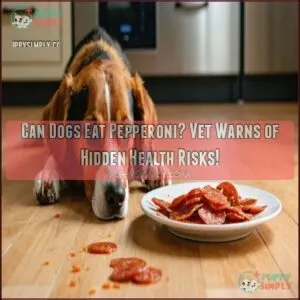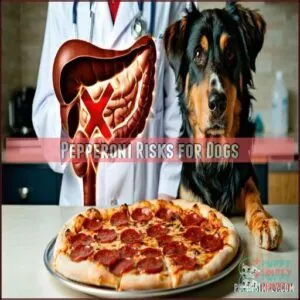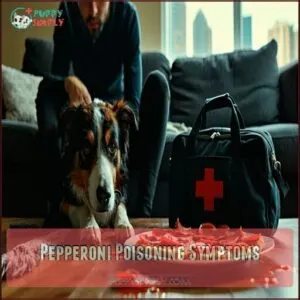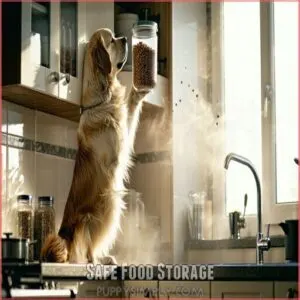This site is supported by our readers. We may earn a commission, at no cost to you, if you purchase through links.

The fat content could lead to pancreatitis, while too much sodium risks dehydration or even sodium poisoning. Spices like garlic or onion powder—common in pepperoni—are toxic to dogs and can damage their red blood cells.
Even a small piece might cause digestive upset, like vomiting or diarrhea. Sure, your furry friend may give you those puppy eyes, but pepperoni is no treat for them.
Stick to safer, dog-friendly snacks for their health—and your peace of mind. Curious about healthier options? Keep reading to find a better alternative!
Table Of Contents
- Key Takeaways
- Pepperoni Risks for Dogs
- Can Dogs Eat Pepperoni
- Pepperoni Poisoning Symptoms
- Preventing Pepperoni Poisoning
- Safe Alternatives to Pepperoni
- Frequently Asked Questions (FAQs)
- Is pepperoni bad for dogs?
- Can dogs eat pepperoni sticks?
- Can dogs eat hot pepperoni?
- Can dogs eat pepperoni jerky?
- Can dogs eat Deli pepperoni?
- Can dogs eat pepperoni pizza?
- What happens if you eat too much pepperoni?
- Can dogs eat pepperoni every 3 months?
- What happens if my dog eats pepperoni?
- Can my dog have one slice of pizza?
- Conclusion
Key Takeaways
- Pepperoni is harmful for dogs due to its high fat, sodium, and toxic spices like garlic and onion, which can lead to pancreatitis, sodium poisoning, or digestive issues.
- Even a small piece of pepperoni can cause symptoms like vomiting, diarrhea, or lethargy, making it unsafe for your dog’s health.
- To prevent accidental ingestion, store pepperoni securely, supervise your dog’s meals, and keep risky foods out of reach.
- Stick to dog-safe treats like lean meats, carrots, or apples to ensure your pup gets healthy and safe snacks without harmful ingredients.
Pepperoni Risks for Dogs
You might think pepperoni is a harmless treat for your furry friend, but this spicy, fatty snack can pose serious health risks to dogs.
Before you share your next slice, it’s vital to understand how pepperoni can trigger dangerous conditions like pancreatitis, sodium poisoning, and digestive distress.
High Fat Content
A loaded slice of pepperoni might seem like a tasty treat, but your dog’s pancreas tells a different story.
High fat content in pepperoni can overwhelm your pup’s digestive system, triggering dangerous pancreatitis. Excessive fatty acids increase obesity risks, potentially causing long-term health complications.
Pepperoni’s high fat can quickly harm your dog, leading to dangerous pancreatitis and serious long-term health problems.
For your furry friend’s well-being, it’s essential to limit high-fat foods and choose healthier alternatives.
Sodium Poisoning
Right in the middle of enjoying a snack, your dog might be at risk from pepperoni’s hidden sodium dangers.
Salt toxicity can strike quickly, turning a tasty treat into a health hazard.
Watch out for these critical warning signs:
- Excessive thirst and frequent urination
- Sudden vomiting or unusual lethargy
- Potential neurological changes like tremors
Sodium intake from pepperoni can trigger serious toxic effects, overwhelming your pup’s delicate system in moments.
Pancreatitis Symptoms
If sodium poisoning wasn’t bad enough, pepperoni can trigger pancreatitis in dogs—a painful condition that attacks the pancreas.
Watch for telltale signs like severe abdominal pain, fever, and vomiting.
Your furry friend might become lethargic, lose appetite, and experience rapid heartbeat.
These canine symptoms signal a serious digestive emergency that demands immediate veterinary attention when dogs eat pepperoni, which is a clear sign of abdominal pain.
Gastroenteritis Causes
Because pepperoni triggers serious gastroenteritis in dogs, understanding the underlying causes is essential.
When dogs consume this fatty, spicy meat, their digestive system goes haywire.
Gastroenteritis from pepperoni emerges through:
- Inflammatory response to high-fat content
- Toxic spice irritation of intestinal lining
- Bacterial overgrowth from compromised gut health.
Stomach inflammation can quickly escalate, leading to severe intestinal damage and prolonged digestive distress.
Dogs eating pepper seasoning can experience similar health issues due to the toxic compounds present.
Can Dogs Eat Pepperoni
During your next pizza night, you might wonder if that slice of pepperoni is safe for your furry friend.
Veterinary experts unanimously agree that dogs shouldn’t eat pepperoni. This processed meat is a minefield of potential health risks for canine nutrition, packed with excessive fat, salt, and toxic ingredients that can harm your pet’s well-being.
While your dog might give you those irresistible puppy eyes, sharing pepperoni could trigger serious food allergies and digestive issues.
Pet safety isn’t just about avoiding immediate dangers—it’s about protecting your dog’s long-term health.
The high sodium content and spices can wreak havoc on your dog’s sensitive system, potentially leading to pancreatitis or other severe canine health complications.
Dogs are also susceptible to sodium poisoning risks from consuming human foods with high salt content.
Stick to dog-specific treats that are designed for their dietary needs.
Pepperoni Poisoning Symptoms
If your dog’s gobbled up some pepperoni, you’ll want to watch for warning signs of potential poisoning.
Watch for vomiting, diarrhea, or lethargy—pepperoni can cause serious health risks requiring immediate veterinary attention.
These symptoms can range from mild digestive upset to serious health complications that demand immediate veterinary attention, including serious health issues.
Immediate Vomiting
Often, your dog’s immediate vomiting after eating pepperoni signals a serious health threat. Those salty, spicy meat slices can trigger sudden food poisoning, causing stomach pain and digestive issues.
Watch for repeated vomiting, which indicates toxic ingredient exposure. Emergency care becomes essential when your furry friend starts throwing up, suggesting potential salt poisoning or severe digestive distress, which may require immediate emergency care.
Diarrhea and Abdominal Pain
After vomiting subsides, your pup might face another gut-wrenching challenge: diarrhea and abdominal pain.
These gastro issues can hit hard when dogs eat pepperoni, causing intense stomach discomfort. Abdominal cramps signal digestive problems that can leave your furry friend whimpering and weak.
Watch for signs of intestinal distress – your dog’s comfort depends on quick recognition and care.
Lethargy and Dehydration
After battling diarrhea, your pup might show signs of serious canine exhaustion.
Lethargy signals pepperoni toxicity’s deeper impact.
Watch for reduced water intake and sluggish movements—classic dehydration symptoms.
Your dog’s electrolyte balance can quickly become compromised, making rest critical.
If your furry friend seems unusually tired and unresponsive, it’s time to call the vet, as this could indicate a serious issue with dehydration symptoms.
Seizures and Kidney Damage
Salt poisoning from pepperoni toxicity in dogs can lead to seizures, a serious health risk.
These sudden episodes may indicate kidney problems or even kidney failure, as excessive sodium strains essential organs.
Toxic effects from high-fat and seasoned foods like pepperoni risk long-term organ damage.
Prevent these risks by avoiding pepperoni and monitoring for alarming symptoms if accidental ingestion occurs, to mitigate potential kidney failure.
Preventing Pepperoni Poisoning
You can keep your dog safe by storing pepperoni out of reach and supervising their meals. If they accidentally eat pepperoni, contact your veterinarian immediately for advice.
Safe Food Storage
Protecting your pup starts with smart food handling. Keep pepperoni out of reach using secure containers or high cabinets.
Follow these kitchen precautions for pet safety:
- Use airtight containers for extra security.
- Store all human treats away from dog food areas.
- Clean surfaces to avoid contamination.
- Label items clearly for food safety.
- Dispose of leftovers carefully.
Proper storage involves using dog food containers to keep your pet’s meals fresh and secure. This practice is essential for pet safety and maintaining a clean environment, which is crucial for proper storage.
Supervising Dog Eating
Keep an eye on your dog’s eating habits to guarantee food safety.
Meal supervision is key, especially when curious pups sniff around forbidden treats like pepperoni.
Pet observation helps prevent sneaky bites of risky foods.
A watchful approach avoids questions like, “Can dogs eat pepperoni?”
Spoiler: Dogs and pepperoni don’t mix well.
Supervise to dodge unnecessary vet visits.
Effective dog eating monitors can also help identify potential health risks.
Contacting Veterinarian
If your dog eats pepperoni, how can you protect their health? Act fast.
Call a veterinarian to discuss pet health risks and get specialized veterinary advice.
Follow these steps:
- Use pet insurance to cover potential costs for urgent care.
- Schedule a veterinarian consultation for a full assessment.
- Follow pet safety precautions to prevent future issues.
It’s essential to understand the pepperoni health risks to keep your dog safe.
Preventing Accidental Ingestion
Accidents happen, but a little prevention goes a long way.
Secure food storage, like sealed containers, keeps curious noses out.
Pet proofing areas where food is prepared or stored helps with accident prevention.
Dispose of leftovers safely, as pepperoni’s toxic ingredients are dangerous.
Emergency planning, including knowing your vet’s contact info, guarantees quick action.
Protect dog health by prioritizing pet food safety.
| Risk | Prevention Step | Outcome |
|---|---|---|
| Pepperoni ingestion | Secure food storage | Reduces access |
| Trash scavenging | Safe disposal | Prevents exposure |
| Overeating | Pet proofing | Limits temptation |
By following these steps, you can ensure your dog’s health and safety, and quick action can be taken in case of an emergency.
Safe Alternatives to Pepperoni
You don’t have to risk your dog’s health with pepperoni when safer and healthier options are available.
From lean meats to crunchy vegetables, these alternatives can offer your pup a tasty treat without harmful ingredients.
Healthy Treat Options
When thinking about healthy snacks, skip pepperoni for dogs.
Instead, offer carrots for crunch, green beans for fiber, or sweet potatoes for a vitamin boost.
These treat alternatives keep canine wellness in check.
Wondering, "Can dogs eat pepperoni"? They shouldn’t.
Prioritize pet safety with simple foods over dog food pepperoni-like options.
Healthy dog nutrition starts with thoughtful choices.
For ideal health, consider choosing healthy dog treats that are nutrient-rich and low in calories, supporting canine wellness.
Lean Proteins and Fruits
Why not swap pepperoni for healthier, pet-friendly snacks?
Lean proteins like cooked chicken or turkey support canine dietary needs with nutrient values dogs thrive on.
For fruit safety, try small pieces of apple or blueberries: they’re safe and rich in fiber.
Great protein sources and healthy snacks include:
- Cooked chicken (no seasoning)
- Plain turkey slices
- Diced apples (core removed)
Dog-Friendly Vegetables
Crunchy carrots, green beans, and sweet potatoes are excellent options for your dog’s diet.
These vegetables provide essential nutrients like fiber and vitamins, supporting pumpkin nutrition benefits for pet health.
Always cook or steam to guarantee vegetable safety and avoid seasonings.
Stick to small portions to keep it digestible.
Unlike dogs eating pepperoni, these are better treats for dog nutrition, providing a healthier alternative with essential nutrients.
Low-Sodium Snack Options
Low-sodium snack options can keep dogs happy and healthy without risking their diet.
Fresh fruits like apples or blueberries, lean meats like plain chicken, and nutritious bites like dog biscuits or healthy chews are great alternatives.
Unlike dogs eating pepperoni, these treats support their well-being. Always check for pet dietary restrictions to offer snacks that are truly pepperoni safe for dogs.
For dogs with specific needs, considering low sodium dog treat options is essential for their health.
Frequently Asked Questions (FAQs)
Is pepperoni bad for dogs?
Feeding pepperoni to dogs is like serving them trouble on a plate.
Its high fat, salt, and spice content can harm your pup, leading to pancreatitis, salt poisoning, or digestive issues.
Stick to dog-safe treats instead.
Can dogs eat pepperoni sticks?
Pepperoni sticks aren’t safe for dogs.
They’re packed with fat, salt, and spices that can upset your dog’s stomach or even lead to serious issues like pancreatitis.
Stick to dog-safe treats for peace of mind!
Can dogs eat hot pepperoni?
It’s surprising how tempting hot pepperoni might seem, but it’s too spicy and salty for dogs.
The heat and ingredients like garlic or onion can upset their stomach, leading to serious issues like pancreatitis or dehydration.
Can dogs eat pepperoni jerky?
Pepperoni jerky isn’t safe for dogs.
It’s packed with salt, fat, and preservatives that can upset their stomach or harm their health.
Stick to dog-friendly ingredients instead, and choose dog jerky treats made with simple ingredients.
Can dogs eat Deli pepperoni?
Deli pepperoni isn’t safe for dogs.
It’s packed with salt, fat, and spices that can upset their stomachs or cause serious issues like pancreatitis.
Stick to dog-friendly treats to keep them healthy and happy.
Can dogs eat pepperoni pizza?
It’s best to skip sharing pepperoni pizza with your dog.
The high fat, salt, and spices can upset their stomach, and ingredients like garlic or onions are toxic.
Stick to dog-safe treats instead.
What happens if you eat too much pepperoni?
Eating too much pepperoni can overwhelm your body with fat, salt, and preservatives, leading to bloating, stomach pain, or even high blood pressure.
Moderation is key—your digestive system will thank you later!
Can dogs eat pepperoni every 3 months?
Pepperoni packs a punch of fat, salt, and spices that your dog doesn’t need—even every three months.
While a tiny taste might be harmless, it’s best to stick to dog-safe treats instead.
What happens if my dog eats pepperoni?
If your dog eats pepperoni, monitor for symptoms like vomiting, diarrhea, or excessive thirst.
Its high fat, sodium, and spices can upset your dog’s stomach or even lead to serious issues like pancreatitis.
Can my dog have one slice of pizza?
Nearly 40% of pet owners admit sharing pizza with their dogs, but it’s risky.
The cheese, crust, and toppings like pepperoni are high in fat and salt.
Stick to plain crust in moderation, if anything.
Conclusion
Think of pepperoni as the 1980s boom box—tempting but outdated for your dog’s health.
Can dogs eat pepperoni? No, it’s a risky snack packed with fat, sodium, and harmful spices.
Even a small nibble can upset your dog’s stomach or lead to serious health issues like pancreatitis or sodium poisoning.
Instead, stick to safer, dog-friendly treats like lean protein, veggies, or low-sodium snacks. Protect your pup’s health by keeping pepperoni off their menu entirely to ensure a healthy life.













